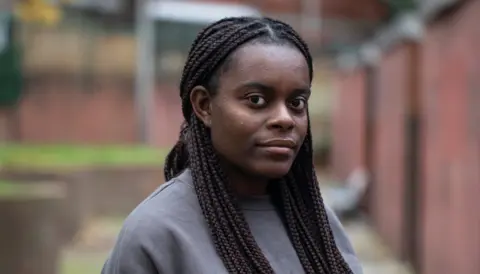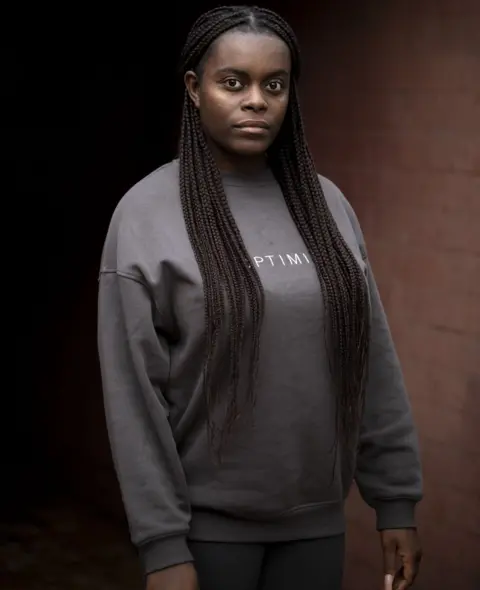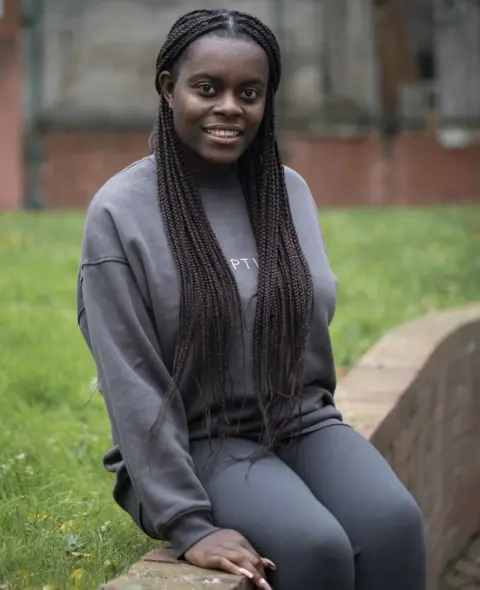Leaving care: ‘I made it to university, but then I fell through the cracks'
 Martin Eberlen
Martin EberlenAbout 10,000 young people move out of the care system in the UK every year. For some there's a sudden cut-off with little support on the other side. Kim Emenike describes her experience of what has been described as a "care cliff".
The summer before Kim Emenike turned 18 her foster carer - who she'd lived with in south London for the best part of a decade - made it clear she wanted Kim out as soon as possible.
Kim's mum had died from cancer when Kim was seven. Her dad wasn't in the picture and there weren't any other blood relatives, so as a young child Kim had been placed into care.
For the first five years things were "absolutely amazing," she says. But from the age of about 13 the relationship with her foster carer began to break down.
"I don't know if I could ever pinpoint exactly why we weren't getting on - I guess we were just very different," she says.
Kim was excelling at school, and had become involved in the local youth council and the UK Youth Parliament. But her foster carer showed little interest.
"That created friction between us because these things were very important to me," Kim says. "The situation got really bad, and it was very hard for me mentally and emotionally."
Kim's social worker and school were aware of the problem, but it was decided that she should remain in her foster placement until she had completed her GCSEs.
"So I had to stay there and get through it," Kim says. "In hindsight, I don't think it was the best decision."

Kim had had various social workers over the years, and at 16 was assigned a personal adviser who'd be with her until she was at least 21 and whose job it was to make sure that Kim understood what services and support were available to her as she became independent.
"I had a Pathway Plan which gives you an overview of the coming years," Kim says, "but it's essentially just a tick box - I wasn't really prepared for what was about to happen."
In some cases, young people can remain in their foster placement after they turn 18 - this is called a Staying Put arrangement and gives them a bit more time and support while they figure out how to live independently. But there was no chance of that for Kim.
"I knew that was never going to happen - my carer had made it very clear that she didn't want me," she says.
So Kim needed to find somewhere else to live.

National Care Leavers' Week
- In October each year National Care Leavers' Week highlights the successes of young people who've been in care and campaigns for improvements to the care system
- This year it falls between 26 October and 1 November

When she had finished her GCSEs, Kim was told she could move out of her foster home and into a hostel and that she should arrange to go and see it. Her foster carer refused to accompany her to the viewing, but a teacher volunteered to go along, to make sure that everything was OK.
"I was lucky that my school was very hands-on and I had a good relationship with my teacher, but I don't think that's an experience that everyone has," Kim says.
The flat at the hostel was pretty basic. She'd need to buy her own toaster and many other essentials - but she had her part-time job at Nando's, and she could plan and save and start budgeting.
But then Kim was told that if she wanted the flat she'd have to sign up there and then and move in straight away.
"I was shocked and absolutely frightened," she says. "I was 17 and I'd never lived on my own. This was a big transition, and everything at that moment seemed unstable and uncertain. [I thought] surely we were going to agree a date, giving me two or three weeks to prepare?
"It was just very daunting, overwhelming and sudden."
As the alternative was staying somewhere she no longer felt welcome, Kim decided she'd have to take the place at the hostel. Her teacher helped her fill in the paperwork and provided the bin bags into which Kim packed up all her worldly belongings.
"I'm so grateful my teacher did all that, but she shouldn't have needed to. Surely social services or my foster carer should have put something in place for my move? Even just given me plastic bags or boxes to put my stuff in," Kim says.
Her foster carer didn't say a word as Kim and her teacher shuttled back and forth from the house to the car carrying all the things Kim had accumulated during the 10 years she'd lived there.
"Are you not going to say anything?" Kim asked her foster carer when it was time to go.
"Oh, bye," her foster carer said as she came to the door. And that was it.
"I'd called it home and saw those people as family," Kim says. "I didn't have anyone else, so to have an exit as blunt as that was hard. I thought, 'Wow, I'm just a statistic.'"
 Martin Eberlen
Martin EberlenLife in the hostel was challenging. All sorts of people were coming and going at all hours, there were fights and disagreements, people threatening each other. A young man who'd recently been released from prison was living on the other side of a thin wall. Downstairs, a woman with severe mental health issues tried to kill herself and it was Kim who found her. Others lived there because they didn't get on with their parents. All of them were vulnerable, homeless and under 25.
At night Kim would lie in bed and cry, unable to sleep because of the loud music that would play until the early hours.
"At the age of 17, having to deal with all that was crazy," she says. "I was vulnerable myself, I was still a child, and being amongst all that it would have been easy to be coerced into doing something that I didn't want to do, purely because I was being exposed to it."
Kim was eligible to claim benefits and she still worked at Nando's, but eventually she had to quit her job to focus on her A-levels.
"I was in year 13 and it was hard - it's your biggest year - you're trying to get into uni and you're worrying about your future," she says.
But even when it was peaceful enough for Kim to be able to concentrate on her school work, the lack of any internet connection at the hostel hampered her ability to study there.
"So I'd have to get up at six to get to college to use their Wi-Fi to catch up on work that I hadn't done the night before," she says. "It was a hard environment to be in - not everyone was striving to get into uni or on to an apprenticeship - a lot of them were just sitting there waiting for a council house. I wasn't with like-minded individuals."
Without her Nando's wages to augment her benefits and unable to access her Leaving Care Grant because she wasn't yet 18, money was tight, too.
"With my benefits I had to pay for my gas and electricity, and I also had to pay Council Tax which I think is absolutely absurd if you're 17 and in full-time education," she says.

Were you in care? How was your transition moving out of the care system?
- Email [email protected]
- WhatsApp: +44 7756 165803
- Tweet: @BBC_HaveYourSay
- Please read our terms & conditions and privacy policy
Neither her foster carer nor her social workers had ever really talked to Kim about the possibility of going to university, but when Kim told her personal adviser she was applying for courses and had various campuses to visit, social services helped cover her costs.
"Financially they were great," she says. "But when I actually got to uni they really let me down."
In 2016, after her A-levels, Kim accepted a place at Loughborough to study International Business.
Her best friend's parents drove her and all of her belongings north in time for freshers' week, and although she was relieved to at last be leaving the hostel behind, adjusting to this new life was much tougher than she had envisaged.
"First year was quite an overwhelming experience and I definitely struggled," Kim says.
"Everyone else had parents who called them, sent food and money, and would come and see them - but I didn't have any of that. I just felt like an alien, and isolated from everyone else. I felt like I was the only care leaver, like an island."
As the end of the year approached and the other students returned home to spend Christmas with their families, Kim was left thinking, "But where do I go?" And eventually, things became too much.
"Mentally I broke down, and I just didn't know who to call," she says. "My social worker had come to see me the week I'd moved in and then I never heard from her again. No emails, no calls, no texts, didn't visit. So when I say I didn't have anyone to call, I literally had no-one."
In desperation, Kim reached out to the pastoral care manager at her secondary school.
"I called her, crying, and I was like, 'Oh my gosh, I don't know what I'm going to do - I don't know anyone, I don't know the services...'"

The care cliff
- Many young people in care have to begin living independently when they reach 18, triggering what the charity Become calls "an abrupt transition into adulthood… at a time in a young person's life when they need stability the most"
- A "concerning number" experience homelessness after leaving care, the charity says - either immediately or before very long
- Jo Dixon, a research fellow at the University of York, says there can be a "sudden falling away of support at various points in the transition from care to independent living" - and that overstretched social workers may focus on those with the most complex and pressing needs at the expense of others
- She adds that the local authority "care leaver offer" introduced in 2017 was a big step forward, making clear what support young people leaving care can expect with regard to housing, education, employment and health
- "What Kim's story really highlights is her own resilience," she says, "young people's determination and self-motivation needs to be nurtured, and carers and social workers need to encourage them"

With help from her school, Kim was directed to student wellbeing and inclusion services at her university and booked in for an emergency meeting with someone who dealt with care leavers.
"I was able to go and express all my concerns and queries," Kim says, "and just having that person to talk to was very important."
In time things settled down, but towards the end of the academic year Kim began to panic.
"Everyone else was worrying about their results, but I was worrying about being homeless from June to October," she says.
Even with her part-time restaurant job and a bursary she received from social services, Kim couldn't afford to stay in her halls of residence over the summer holidays and had to move in with her best friend's family until the start of the autumn term.
"I literally had nowhere else to go," she says.
Social services didn't know where Kim was living. No-one was keeping an eye on her or making sure she had somewhere safe to stay. She hadn't even heard from her personal adviser since the beginning of term.
"I could have been anywhere," she says. "I could have been homeless."
And at the beginning of the next academic year, Kim discovered that she just didn't have enough money to make the deposit on her accommodation. With no-one else to turn to she called social services for help.
She asked why her personal adviser hadn't contacted her for more than a year, and was told that the social worker in question had left.
"Does that not ring any alarm bells?" Kim asked them.
"We think you just fell through the cracks," she was told.
They'd tried to contact her, they said. But Kim hadn't heard from anyone and hadn't changed her number or email address.
"I know I'm not someone that you need to check in on all the time, but it would have been nice to hear just something from them," she says. "I had absolutely nothing and that's poor."
 Martin Eberlen
Martin EberlenKim graduated last year. She now has her own place to live and recently started a job as a high-flier in the Civil Service. She has refused to let her past dictate her future, but looking back she feels she should have been better supported in her journey from care to independence.
For one thing, she criticises social services for failing to encourage her ambition to study and do well.
"The system doesn't push young people to aim higher and pursue their passions. Social services should be driving people to university or apprenticeships or starting up their own businesses," she says.
"I've spoken to other young care leavers who would have gone to uni or done an apprenticeship had they known certain things would have been in place - but we're not well informed, we're just left to wing it, and at the age of 16 or 17 making decisions without being guided is very hard."
But her main criticism is that they let her fall off their radar, despite their duty of care.
"That's my issue - the safeguarding," she says. "It's not OK that they didn't call in and check on me - I could have been anywhere, I could have been being exploited, and I could have been homeless."
She urges other young care leavers who might be struggling to reach out if they need help. If social services are unhelpful she points to the organisations Become, the national charity for children in care and care leavers, and Propel, which informs care leavers about the support available at colleges and universities.
As she discovered, universities also often have wellbeing services that will help students in difficulty.
In fact, during her final year at Loughborough Kim helped create new guidelines for supporting young care leavers starting at the university.
"And that was work that I was really proud to be a part of," she says.
Kim has recently been told that her own social work case will be wound down this year.
"That's quite an interesting feeling. I've been with those guys since I was seven years old and now I'm 23," she says.
"But I've always been quite independent, and I'm at a stage in life now where I'm able to help myself. I should be OK."

How did you find the transition from being in care to moving out of the care system? Share your experiences by emailing [email protected].
Please include a contact number if you are willing to speak to a BBC journalist. You can also get in touch in the following ways:
- WhatsApp: +44 7756 165803
- Tweet: @BBC_HaveYourSay
- Please read our terms & conditions and privacy policy
If you are reading this page and can't see the form you will need to visit the mobile version of the BBC website to submit your question or comment or you can email us at [email protected]. Please include your name, age and location with any submission.
